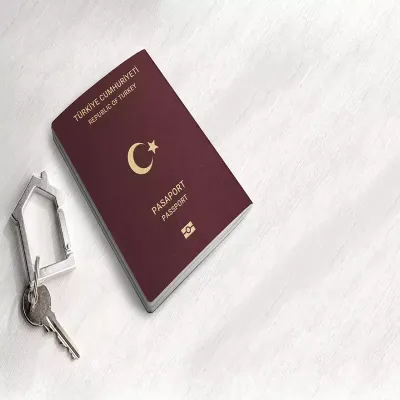Is it safe to buy property in Turkey? Turkey is a popular choice for foreigners looking to invest in real estate. It has great people, a vibrant culture, and stunning scenery.
However, buying real estate abroad can take a lot of work, especially given the numerous rules and laws that must be followed.
Do not worry! The purpose of this blog is to facilitate foreign purchasers' understanding of the Turkish real estate market. We will cover everything you need to know in an easy-to-understand manner.
Additionally, you can review our Turkey property pack for a more thorough study.
Is it possible for a foreigner to buy and possess real estate in Turkey?
If you are an American, we have a special blog entry about how US residents can purchase and own real estate in Turkey. Foreigners can indeed buy real estate in Turkey, but there are a few things to keep in mind.
It will be easier for you to move through the process if you are aware of these specifics. First off, it is true that foreigners are allowed to acquire real estate in Turkey. There are certain limitations, though.
For example, the total land area that you can purchase cannot be greater than 10% of the district's total area in which the property is situated. Furthermore, some areas—like military zones—are off-limits to foreign ownership.
As a foreign property owner, you have many of the same rights as Turkish nationals. You are free to give your property away, sell it, or rent it out.
But, you should be aware that purchasing real estate as a foreigner differs from buying it as a local in several ways, such as the requirement for extra documentation and, in certain situations, military clearance. The laws governing property ownership can change based on your country of origin.
For example, limits or additional procedures may apply to citizens of certain nations due to reciprocal agreements or other diplomatic concerns between Turkey and their home country.
Purchasing real estate in Turkey does not require residency. Even if you do not reside in the nation, you are still able to buy real estate. Due to this, Turkey is a desirable location for foreign investors and vacationers alike.
It is not necessary to have a specific visa or authorization to purchase real estate in Turkey. But, if you choose to apply for a citizenship or residency visa, having property will help your case.
Is it possible to buy and hold property in Turkey and obtain residency status?
Invest in real estate to become a resident of Turkey; there is a dedicated program for this aim. Those who are interested in living in Turkey and international investors find this strategy especially appealing.
You are eligible to apply for a temporary residence permit once you purchase real estate in Turkey. This authorization is generally valid for one or two years, but you can extend it as long as you are the property's owner. However, it is important to keep in mind that this is only a temporary home.
Residency can result from real estate investment, but there are processes involved. Upon purchasing your home, you will need to apply for a resident permit. The application will be sent to Turkey's Directorate General of Migration Management.
The title deed and a valuation report attesting to the property's compliance with the minimum value requirement serve as proof of ownership, which you must present.
However, the minimal investment is much larger if your objective is to use real estate investment to get Turkish citizenship. A valid passport, evidence of adequate funds to maintain oneself during the stay, health insurance, and a spotless criminal record are among the prerequisites for a residency visa.
Additionally, you will need to fill out the required application forms and supply photos.
What dangers come with purchasing real estate in Turkey?
We have a piece specifically about the dangers of buying real estate in Turkey. When purchasing real estate in Turkey, the primary danger is that the seller's name may not appear on the property's title deed.
This is a result of the Turkish Land Registry's incomplete computerization, which makes it challenging to identify the true owner. Additionally, before making a purchase, buyers should make sure they are aware of any restrictions that may apply to foreign ownership of property in particular parts of Turkey.
The possibility that the seller may have borrowed money against the property and the lender may have a claim on it is another risk to take into account. This is known as a lien. Verifying this before making a purchase is crucial because it may have an impact on the buyer's capacity to get a mortgage or other financing.
Conclusion:
In conclusion, buying property in Turkey can be a secure and rewarding investment if approached with proper due diligence. By working with trusted professionals, verifying legal documents, and understanding the local regulations, you can mitigate risks and enjoy the benefits of owning property in a vibrant and growing market.
With the Turkish government's protections and a strong real estate infrastructure, foreign buyers can feel confident in their purchases when taking the right precautions.
.webp)

















